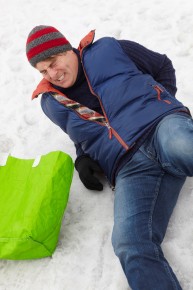
Visitors and Premises Liability in Maryland
 Accidents happen, and in some cases, you may find yourself having been injured in an incident that took place on someone else’s property. Owners or possessors of property may be liable for your injuries, as they are generally responsible for the maintenance of their property and for any hazardous conditions that may be located on that property under the legal theory of premises liability. Under Maryland law, the owner or possessor of the property has a duty to visitors to keep the premises free from dangerous or hazardous conditions. Maryland visitor status is typically divided into four categories.
Accidents happen, and in some cases, you may find yourself having been injured in an incident that took place on someone else’s property. Owners or possessors of property may be liable for your injuries, as they are generally responsible for the maintenance of their property and for any hazardous conditions that may be located on that property under the legal theory of premises liability. Under Maryland law, the owner or possessor of the property has a duty to visitors to keep the premises free from dangerous or hazardous conditions. Maryland visitor status is typically divided into four categories.
Categories of Visitor Status in Maryland
- Invitee: those who are on the premises with the owner or possessor’s permission for a purpose related to the owner or possessor’s business, such as a customer in a store;
- Licensee by invitation: those who are on the premises as a social guest;
- Bare licensee: those who are on the premises with the owner or possessor’s permission but for the licensee’s own purpose, such as if a person enters a store or restaurant for the sole purpose of using the restroom; and
- Trespasser: those who are on the premises without permission.
The level of duty or care the owner or possessor owes to persons on their premises varies for each of the four categories:
- An owner or possessor owes a duty of ordinary care to an invitee to keep the premises safe
- An owner or possessor owes a duty to a licensee by invitation to warn the licensee of dangerous conditions that are known to the owner or possessor but are not easily discovered
- An owner or possessor only owes a duty to a bare licensee to refrain from willfully or wantonly injuring the licensee or from creating new sources of danger without warning the licensee
- An owner or possessor owes no duty to a trespasser except to refrain from willfully or wantonly injuring or entrapping the trespasser
If your visitor status is that of an invitee, the property owner or possessor has the obligation to keep the premises free from hazards such as spilled liquids on the floor or broken floors and stairs that are known or should reasonably be known to the owner or possessor. If you are a licensee by invitation, the property owner or possessor only needs to warn you about dangerous conditions on the premises, such as by posting a sign that says “Falling Ice” or “Wet Floor.” If you are a bare licensee, the owner or possessor need only not intentionally injure you while on the property or create new hazardous conditions without warning you, such as posting a “Wet Floor” sign if the owner or possessor spills a liquid on the floor. If you are a trespasser, the owner or possessor need only refrain from intentionally injuring or trapping you.
There is also a notice requirement for personal injury claims in Maryland. Just because someone slips and falls, does not automatically mean there is liability. The property owner must have notice of the defect, hazard, or dangerous condition in time to be able to correct it.
Injuries on Someone Else’s Property in Maryland
Slips and falls are the most common cause of injury claims involving premises liability, although other causes include falling objects, fires, electrical hazards, or inadequate security. Injuries that can occur while on someone else’s property include:
- Broken bones
- Soft tissue injuries
- Neck, back, and spinal injuries
- Head and traumatic brain injuries
- Burns
- Electrocution
Injuries resulting from accidents on another person’s premises can have far-reaching effects, including not only medical expenses, but long-lasting disability and pain and lost income from missed work.
Filing a Premises Liability Claim in MD
If you are injured while on another person’s property, you may be able to seek compensation for damages suffered through a premises liability claim. When pursuing a premises liability claim, it is important to collect as much information regarding the circumstances leading up to your accident as possible, as well as to understand what your visitor status was at the time the incident occurred. That will determine the property owner’s liability and what kind of recovery you are able to obtain. Filing a suit can be a long, complicated process and is best done by an experienced personal injury attorney who can handle the complicated legal procedures so that you can focus on recovering from your injuries.












